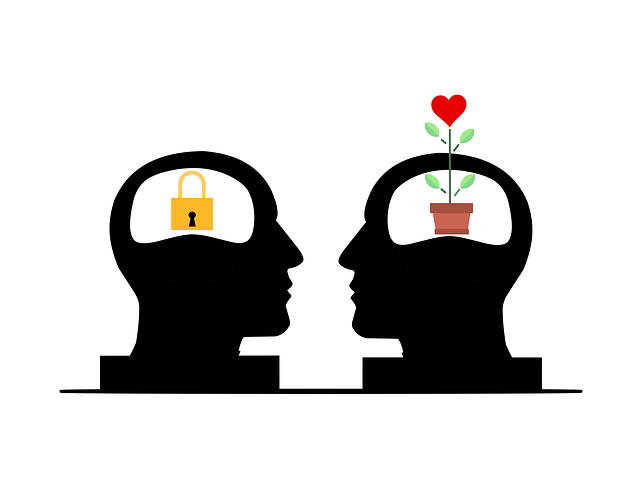Emotional Intelligence (EQ) is a crucial asset for managing life transitions and maintaining healthy relationships, significantly impacting overall well-being. Englewood Major Life Transitions Therapy focuses on EQ development through counseling, mindfulness exercises, and confidence-boosting techniques to help individuals process intense emotions related to career shifts, relationship endings, or new parenthood. The therapy incorporates mental wellness journaling, stress management workshops, self-care routines, and healthy habits to enhance resilience and normalize help-seeking in communities. By cultivating self-awareness, empathy, and a growth mindset, this approach equips individuals with lifelong emotional intelligence skills for improved mental health.
Emotional intelligence (EQ) is a powerful tool for navigating life’s challenges, especially during major transitions. This article explores the profound impact of EQ on well-being and introduces evidence-based strategies for enhancing it. We delve into the role of therapy in facilitating personal growth, particularly during significant life changes, and provide practical tips for cultivating self-awareness and empathy. Additionally, we discuss how building resilience through increased EQ enables individuals to thrive in the face of adversity, highlighting the value of Englewood Major Life Transitions Therapy in this transformative process.
- Understanding Emotional Intelligence and its Impact on Well-being
- The Role of Therapy in Enhancing Emotional Intelligence During Life Transitions
- Practical Strategies for Developing Self-awareness and Empathy
- Building Resiliency and Navigating Challenges with Increased Emotional Intelligence
Understanding Emotional Intelligence and its Impact on Well-being

Emotional Intelligence (EQ) refers to our ability to recognize, understand, and manage our own emotions as well as empathize with others’ feelings. It’s a crucial component of overall well-being, significantly impacting how we navigate major life transitions and maintain strong relationships. In the context of Englewood Major Life Transitions Therapy, EQ plays a pivotal role in helping individuals process and overcome emotional challenges.
Through Emotional Healing Processes, therapy sessions equip clients with tools to increase self-awareness, enhance emotional regulation skills, and foster more profound empathy towards others. This, in turn, contributes to improved mental health and reduced symptoms associated with mental illnesses. Moreover, by integrating EQ into Mental Health Education Programs Design, communities can empower individuals to recognize the signs of mental distress early on and provide support before issues escalate. These efforts intersect with Mental Illness Stigma Reduction Efforts, creating a more inclusive and understanding society where people feel comfortable seeking help without fear of judgment.
The Role of Therapy in Enhancing Emotional Intelligence During Life Transitions

Englewood Major Life Transitions Therapy plays a pivotal role in enhancing emotional intelligence during significant life changes. These transitions, whether they’re career shifts, relationships ending or new parenthood, can trigger intense emotions that may feel overwhelming. Professional therapy provides a safe space to process these feelings, fostering self-awareness and understanding. Through mindfulness exercises, counseling sessions, and confidence boosting techniques, individuals learn to recognize and manage their emotional responses effectively. This not only aids in navigating the current transition but also equips them with lifelong skills for future challenges.
In addition, therapy integrates mental wellness journaling exercises for guidance, helping clients track their emotional journeys, identify patterns, and cultivate resilience. By combining talk therapy with practical tools like journaling, Englewood Major Life Transitions Therapy empowers individuals to build emotional intelligence, enhancing their ability to cope with stress, prevent depression, and foster overall well-being.
Practical Strategies for Developing Self-awareness and Empathy

Building self-awareness and empathy is a crucial aspect of emotional intelligence development. This journey often begins with introspection and mindfulness practices. Engaging in regular reflection allows individuals to gain deeper insights into their emotions, strengths, and areas for growth. Keeping a journal to document thoughts and feelings can help identify patterns and triggers, fostering a more profound understanding of oneself. Additionally, practicing mindfulness meditation enables one to stay present, enhancing self-awareness during daily interactions.
At Englewood Major Life Transitions Therapy, we emphasize the importance of these practices as cornerstones for personal development. By integrating self-care routines into daily life, individuals can support their mental health and emotional well-being. This includes adopting healthy habits like regular exercise, sufficient sleep, and a balanced diet, which positively impact overall mood and resilience. Applying mind over matter principles encourages a growth mindset, helping individuals navigate challenges with adaptability and resilience. Moreover, active listening and open communication strategies facilitate empathy by fostering deeper connections and understanding in relationships.
Building Resiliency and Navigating Challenges with Increased Emotional Intelligence

Emotional intelligence (EI) plays a pivotal role in helping individuals navigate major life transitions and challenges with resilience. By cultivating self-awareness exercises, people can gain a deeper understanding of their emotions, enabling them to respond thoughtfully rather than reacting impulsively during stressful situations. This increased self-awareness is a cornerstone of EI, fostering better decision-making skills and enhanced relationships.
Englewood Major Life Transitions Therapy offers valuable resources like Stress Management Workshops designed to empower individuals with tools for anxiety relief. These workshops, grounded in the principles of EI, teach coping mechanisms that help participants navigate life’s ups and downs more effectively. Through practice, individuals build resilience, becoming better equipped to handle challenges and seize opportunities that arise, ultimately leading to improved overall well-being.
Englewood Major Life Transitions Therapy can be a powerful tool in fostering emotional intelligence, enabling individuals to navigate challenges with enhanced self-awareness and empathy. By understanding the impact of emotional intelligence on well-being and utilizing practical strategies for development, folks can embark on a journey of personal growth and resilience. This transformative process allows them to embrace life’s transitions with greater ease, ultimately enhancing their overall symphony of mental and emotional health.









